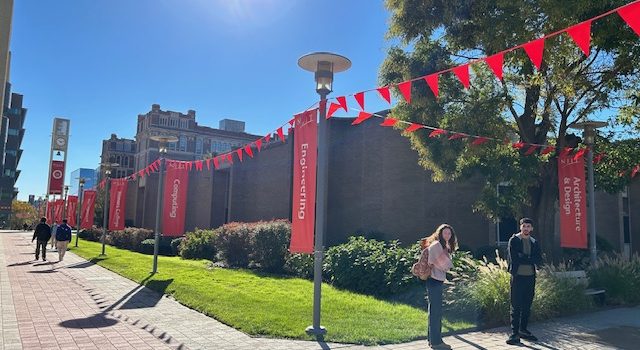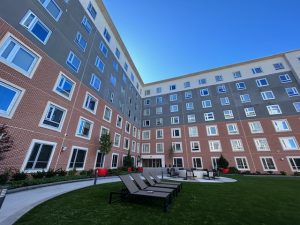Getting To Know: New Jersey Institute of Technology (NJIT)-Again
I visited New Jersey Institute of Technology (NJIT) as part of an October counselor’s program. NJIT is one of only 35 polytechnic universities in the U.S. It is also one of only 15 that is also a Minority Serving Institution. NJIT has approximately 9,500 undergraduates. The undergraduate student body is currently 70 percent male and 30 percent female, but the ratio is approaching 50/50 within the Honors College. Sixty-one percent of the undergraduate student body are men and women of color.
Prior to attending the counselor’s event, I watched a profile about NJIT on The College Tour, then watched it again after I visited campus in person. I have also updated my NJIT Pinterest page. NJIT has made great strides to update the look and feel of their campus over the last 30 years as you will see from the College Tour program and the photos that I found. The campus has better curb appeal, became better equipped to accommodate new technology and also became a more livable place for students.
Alumni from the late 70s and earlier might be surprised when they return to campus, especially if they had not been there since graduation. When I got ready to return home, I saw a historical display of NJIt at the Newark City Subway station (photo below). From reading the display while waiting for my subway, I learned that NJIT did not have a residence hall on campus until 1979. However, the school did have Greek houses.

Some might not think about sculpture on the campus of a polytechnic university. However, this large 50s/60s TV caught my attention. My father worked in the electronics industry during that time when many television sets and their parts were made in New Jersey.

Prospective students must apply to enter one of six schools at NJIT:
- Newark College of Engineering
- Hillier College of Architecture and Design
- Martin Tuchman School of Management
- Ying Wu College of Computing
- College of Science and Liberal Arts
- Albert Dorman Honors College (in co-enrollment with one of the other five schools).
While NJIT is test optional, prospective Honors College students must submit scores. SAT scores of 1370 or better or an ACT Composite score of 30 or better is expected. The scores in reading and mathematics will likely be considered in the context of the intended major. Only 40 percent of the incoming students in the Class of 2o26 submitted SAT scores. The middle 50 percent scored between 1220 and 1460. The Honors College students were probably a significant share of the population that submitted scores.
Why does NJIT’s stature as a polytechnic university matter?
Within New Jersey there are four public institutions that award engineering degrees. They are:
- NJIT
- Rowan University
- Rutgers University
- The College of New Jersey
There are also three private schools that offer engineering degrees:
- Fairleigh Dickinson University
- Princeton University
- Stevens Institute of Technology
NJIT and Stevens stand out as polytechnic institutions. They are doctoral granting research universities that grant the majority of their degrees in mathematics, sciences and technology. NJIT and Stevens also stand out by offering programs that blend science and technology with business, humanities and social sciences. NJIT offers 51 undergraduate majors, only one more than The College of New Jersey, which is a smaller school. Larger schools such as Rutgers or Rowan offer far more courses of study. They also have far more research obligations outside of science and technology.
NJIT also offers several majors that are tough to find at other schools. For example:
- This is the only public college in New Jersey that offers an undergraduate program in Financial Technology, aka ‘Fin Tech’.
- NJIT also offers nine engineering technology programs that are less math-intensive than traditional engineering degrees as well as an interdisciplinary General Engineering program.
- There are nine undergraduate options within Computer Science as well as four options for double majors and seven minors for non-majors.
- NJIT is also the only school in New Jersey with an undergraduate school dedicated to architecture and design.
- The Honors College has more partnerships towards law and medical degrees than any school in New Jersey.
Aside from the majors, who should choose a school like NJIT?
It helps to be comfortable with city life. The 45-acre NJIT campus is actually smaller than Stevens’ campus (55 acres) though NJIT has over twice as many undergrads. While NJIT is next to Rutgers-Newark, the campus is not as close to a direct train to New York as Stevens’ campus in Hoboken. Students can ride the Newark City Subway to get a train from Newark-Penn Station to Manhattan. Or they take a shuttle to the Newark’s Broad Street Station to go into Hoboken.
NJIT made a major investment in its fitness center (photo below) to support a D-1 scholarship sports program as well as club and intramural sports. As I saw when I visited DePaul, the fitness center appeared to be more of a social center for students than the student center. But I cannot think of NJIT as a “spirit and sports” school, even to the level of DePaul, which competes in the Big East, one of the dominant basketball conferences in the country. NJIT’s teams compete in America East, where a conference champion is unlikely to get a high seed in a regional round of an NCAA tournament. According to the NCAA, NJIT averaged just under 450 fans per home men’s basketball game during the 2022-23 season. The women’s basketball averaged less than 300 per home game during the 2021-22 season, the last one that the NCAA had data available.
r
Newark has several assets besides location. It is home to Prudential, Audible and Panasonic as well as the New Jersey Performing Arts Center and the Prudent;al Center Arena, home to the NHL New Jersey Devils. The Ironbound has some of the best Spanish/Portugese food that you will eat anywhere. The city’s economic progress has been compared to Brooklyn in the media. There are some similarities, especially the ideas behind entrepreneurship and technology that have come from NJIT and the city’s business public-private partnerships, and interests in neighborhood investment. However, Newark is not like Brooklyn, or even Hoboken, which are more accessible to Manhattan and offer more for recent graduates to do when they’re not working.
Preparation is extremely important.
STEM students should be ready to take the first Calculus, Chemistry and Physics classes for degree credit on the first day of their freshman year and try not to fall behind. Those who are extremely well prepared might want to use their AP or IB credits to fulfill general education requirements outside of their major to make room to take on additional STEM or business electives or take co-op for credit as well as pay. Here’s good news: Students are more likely to see smaller classes at NJIT than they would have at Rutgers and other similarly large state schools. Only eight percent of all undergraduate classes that took place in 2022-23 had over 40 students, low for a state school. Only six had more than 100.
One might argue that NJIT means as much to New Jersey as Georgia Tech does to Georgia. For instance:
- NJIT’s six schools are organized much the same way as Georgia Tech’s undergraduate schools.
- They are similarly rigorous institutions where it often takes over four years to earn a degree.
- Both schools compete in NCAA D-1 varsity scholarship sports
- Their campuses are located in similar neighborhoods, though NJIT has better access to mass transit.
- Both schools are located in the largest cities in their states.
- Maker spaces and student-focused research labs and product development are taken quite seriously by both schools.
- Both schools offer tremendous opportunities for community service within their home cities.
But there are significant differences:
- Forty-five percent of Georgia Tech undergraduates are women versus 27 percent of NJIT undergrads.
- Georgia Tech has the more residential campus, housing 44 percent of its undergraduate student body; less than a quarter of NJIT students live on campus.
- NJIT is more about opportunity than turning prospective students away. About two-thirds of applicants to NJIT are accepted versus less than 20 percent at Georgia Tech.
- While Georgia Tech plays football, the school competes in only 14 varsity scholarship sports. NJIT, which has less than half as many undergrads, competes in 17.
NJIT has apparently attracted better students since 2010.
In that year the freshman retention rate was 79 percent according to the school’s Institutional Research office. Yet in 2022, 89 percent of the freshmen returned for their sophomore year, very good considering the STEM focus of the school and the academic demands of the degree programs. Just under half of NJIT undergraduates finish their degrees in four years. Two-thirds of the engineering and computer science students need five. And there are some programs such as architecture and combined degrees that take more time.
NJIT houses just under half of a freshman class and less than a quarter of the undergraduate student body, including those who live in Greek Village.
Two of the first-year halls, Cypress and the Honors College, are suite-style where two bedrooms, usually double, share a common bathroom. The third, Redwood, is a traditional corridor-style hall where several rooms share two bathrooms. Oak, an upper-class hall, has suite style living with kitchenettes and bathrooms as well as apartments. Laurel, the other upper-class hall, is suite-style and so are the spaces in Greek Village. However, Greek life is not overly popular at NJIT, attracting four percent of the men and five percent of the women. The Honors College housing includes a common area on each floor by the elevator as well as smaller study lounges. With space for 360 students, it accommodates most of the s Honors academic population during and after the freshman year.
NJIT also has some of the nicest upper-class apartment-style housing that you will find at any school anywhere. It’s rare to see an enclosed garden like this in an urban apartment complex, especially one on a college campus.
It’s tough to know whether students also live close to campus or commute from further away.
American Campus, a private developer of student housing, constructed an apartment complex within easy walking distance of the NJIT campus. NJIT is of three schools that make up Newark’s University Heights neighborhood, along with Rutgers-Newark and Rutgers New Jersey Medical School. It’s possible to find very nice off-campus housing, but rents will likely exceed $1,000/person/month for something within walking distance or a very short commute. Parking is really tight at NJIT for students who commute by car.
Among the better reasons to choose NJIT are the opportunities to do paid research with faculty as well as pursue either internships or co-op.
Students who are interested in co-op choose the semester in which they want to work, then sign up a three-credit co-op course. They may choose to work 20 hours per week and take up to four classes outside of co-op or work full time and take up to two classes. They may take the co-op course twice for credit. But unless the student enters NJIT with some AP or IB credits to apply towards their degree, this will extend their degree program for an additional semester or year. Other New Jersey schools, including Stevens and Rutgers-New Brunswick, also offer co-op for engineering. But NJIT is the only one that makes it available for all other majors and offers it during the summer as well as the fall and spring.
It’s tough to beat the value proposition-especially for the Honors College.
NJIT gets high ratings for return on investment from published college rankings. One reason is the demand for the majors; another is the high costs of living in the New Jersey-New York metro area. However, the estimated resident total cost of attendance is approximately $39,000. That’s among the highest for any public institution in the country. The estimate for non residents is more reasonable, slightly less than $56,000, compared with out-of-state charges for other state schools. The good news: residents and non-residents would pay less than Stevens’ students pay for tuition and fees alone.
Less than a fifth of the Class of 2026 received a merit award and the Institute met. on average, less than 60 percent of need. However, the average student loan debt for 2021 graduates averaged $28,000. That’s $1,000 over the maximum that a student can borrow over four years from the Federal Student Loan program. But the average indebtedness for borrowers is not bad for those who needed the extra year.
Those who get into the Dorman Honors College can qualify for generous awards that could cover up to full tuition and fees as well as room and board. Honors students need to maintain a 3.2 GPA to keep their awards. Other scholarship recipients need to have at least a 3.0. Good news: the average merit award averaged close to full tuition and fees for the Class of 2026. Over 200 NJIT freshman are selected for honors, more than ten percent of the freshman class. NJIT also aids students who are selected for an Economic Opportunity Program and invites them to take part in a summer program to prepare them academically and better acquaint them to college life. Between 130 and 140 students are selected for this program.
Conclusions
NJIT is a great value for students who are serious about science and technology and comfortable with city life. It has practically any academic and career-related resource that a motivated student could want, especially for those who get into the Honors College. However, while NJIT is trying to nurture a residential campus life, there are other schools that have more spirit for sports and weekends. NJIT appears to be a school where students work on weekend days, then trek off campus for entertainment.
NJIT is also trying to take on two challenges, to expand as a polytechnic research university while also trying to become a more diverse and inclusive institution. There have been successes and NJIT should be admired for them. NJIT has created so many opportunities for so many people for a long time and will create many more. .
Report Card: NJIT
- 4-year/6-year Graduation Rates: C/B
- Freshman Retention: B+
- Costs: B (residents)/B+ (non-residents)
- Curriculum: A
- Community: B
- Comforts: B+
- Connections: A
Want to know more about me?
Buy my new book, The Good College!
Listen to my latest interview on ‘Tests and the Rest’ with Amy Seeley and Mike Bergin!
Hear my talk, What Exactly Is a Good College? hosted by test-prep experts Amy Seeley and Mike Bergin on Tests And The Rest!
Check out my talk, College Is A Learning AND Living Community hosted by Dr. Cynthia Colon from Destination YOUniversity on Voice of America Radio!
Sharing is caring!


